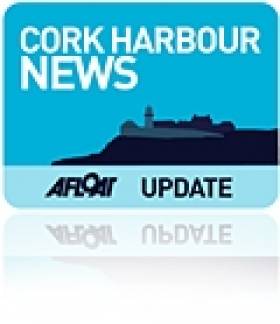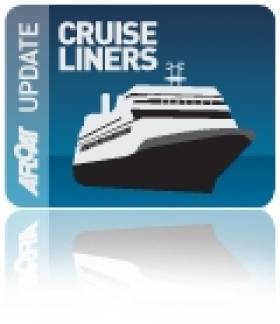Displaying items by tag: Michael McCarthy
#lusitania – President Michael D Higgins will lead a commemoration event in Cobh on Thursday, 7th May to mark the centenary of the sinking of the Lusitania. The event, which will also be attended by a number of other VIPs including the British, German and US ambassadors to Ireland is expected to see a large turn-out and the public are advised that traffic and parking restrictions will be in place throughout the day.
Road closures will be in effect in Casement Square and on part of Westbourne Place from 11.30am until 10.30pm.
Captain Michael McCarthy, Commercial Manager of the Port of Cork who is lead organiser of the event said "We expect that up to 10,000 people from across Ireland and beyond, many of whom have personal connections to the Lusitania disaster, will descend on the town of Cobh to remember all those who lost their lives on the 7th May 1915. For anyone intending on travelling to the event, I would urge them to take the train as it is the easiest and most direct way to get to the heart of Cobh town where events will be taking place."
Irish Rail will be running additional services throughout the day on the Cork - Cobh line giving a service every 30 minutes from 06.30hrs until 19.30hrs. Cobh can also be accessed from stations at Midleton, Carrigtwohill, Little Island and Glounthaune, where free parking is available. For train timetables and for further information, please see www.irishrail.ie
Superintendent John Quilter said "Additional Gardaí will be in place for the day and will be aided by event stewards to ensure that everyone who attends has an enjoyable and safe experience. I would encourage all those travelling to Cobh to plan their travel in advance and to check for updates in relation to parking and traffic restrictions."
The main points are as follows:
· No parking at Westbourne Place and Casement Square.
· One way system going into Cobh along the High Road.
· One way system going out of Cobh along the Lower Road.
· Disabled parking is outside the Sirius Arts Centre on Lower Rd. – display badge and follow signage.
· Obey Directions of Gardaí and stewards at all times.
· Secure vehicles and don't leave valuables in them.
· Where applicable, display parking badges clearly en route to the event.
· Parking will be available at the Verolme Cork Dockyard adjacent to Rushbroke rail station. Additional parking will be available at Cobh Pirates Rugby Club and the Cathedral car park.
The Cross-River Ferry will run two vessels throughout the day for those travelling from the west side of the harbour.
CMA–CGM Win Port of Cork Sponsored Deep Sea Shipping Award
The Port of Cork was delighted to sponsor the Irish Exporter Awards category, 'Deep Sea Shipping Company'. The award was presented to CMA-CGM Shipping Ireland Ltd for providing global container shipping solutions for companies in all sectors, at an awards ceremony in Dublin's RDS on Thursday 25th November, attended by Minister Batt O'Keefe.
Captain Michael McCarthy, Commercial Manager Port of Cork said: As Ireland's primary deep water port, the Port of Cork has a long term focus on meeting the needs of deep sea shipping lines and understands the importance of growing the export market.'
He continued: 'This is the second year sponsoring such an award and we were delighted to sponsor the Deep Sea Shipping Company Award for 2010. We look forward to supporting the growth of international trade for both current and future economic prospects.'
Other nominees of this category were Dublin based companies: APL Ltd., CMA-CGM Shipping Ireland Ltd. and Maersk Line.
Over 100,000 Cruise Passengers Visit Port of Cork in 2010
2010 proved to be another busy year for the Port of Cork with a total of 52 cruise liners calling to Cobh, Ireland's only dedicated cruise berth.
Onboard the 52 cruise liners were a total of 100, 414 passengers and crew, a record number to visit Cork.
Following the Port of Cork's investment in Cobh's dedicated cruise berth over the last five years, some of the largest liners in the world are now capable of berthing, bringing with them thousands of passengers and crew, all of whom contribute to the local economy. With a ambitious target to grow the cruise business even further, the Port of Cork are aiming to increase the number of cruise liner calls over the next five years to seventy-five.
Speaking at a recent Port of Cork cruise seminar entitled Achievement of growth in the cruise business in Cork, Captain Michael McCarthy, Port of Cork Commercial Manager said: 'We are keen to grow the business even more over the next five years. This will mean further investment of Cobh Cruise berth from the Port of Cork to handle even larger ships and to increase the number of current overnight stays.'
He continued: 'While the Port of Cork is committed to investment in this area we recognise that the region is the biggest benefactor from this business and we would therefore encourage the local authorities and organisations to support this investment.'
In a recent study carried out by UK cruise consultants, GP Wild, the on average spend per in-transit passenger is approximately €73 per day while in port. Captain McCarthy commented: 'With so many passengers arriving into Cobh and Cork, the impact that this has on the local economy is very positive.'
During the cruise seminar Captain McCarthy talked about Cork's potential as a cruise capital saying that: 'Feedback from cruise companies visiting Cork is very positive. Direct access to the quayside for passengers coupled with the accessibility of trains to Cork and the historic town of Cobh and its attractions on their doorstep, makes Cobh an attractive port of call. However tour operators and shore side attractions must all work together to offer passengers exciting full and half day tours, while also making it a memorable experience so that they may return.'
Also speaking at the Port of Cork cruise seminar was Clare Newman Port of Dover, Paul Ellerby UK Cruise Consultant and Aiden Pender Failte Ireland.
Since 1991 Port of Cork passenger and crew numbers have grown by nearly 85,000, highlighting the rapid growth of the sector which is predicated to continue. Cruise bookings for 2011 have already exceeded 2010 calls and potentially could be the busiest yet for the Port of Cork.
The 2011 Port of Cork cruise bookings list will be available at www.portofcork.ie at the end of January 2011.































































